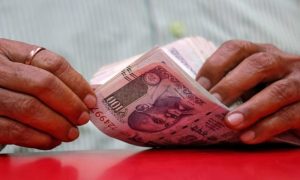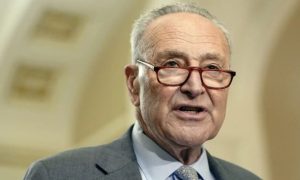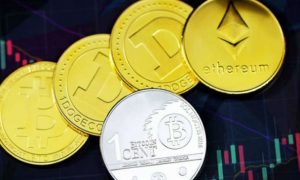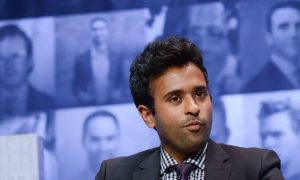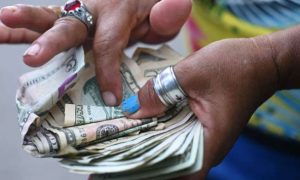Politicians fighting all the time, unable to agree even on basic budget matters and turning the House chamber into a schoolyard brawler’s arena. People losing longtime friendships after being attacked for their political views on social media. America’s vaunted democracy in genuine peril and a nation digesting the possibility that a man they once sent to the White House could end up in the big house.
Also Read- Trump’s list of legal headaches just keeps growing
The state of American politics has reached a nadir, and it’s leading people of many ideological stripes to a similar conclusion: there has to be another way.
The thirst for something and someone new has given life to the most recent incarnation of a third-party offering for president. Not that No Labels, a well-funded and determined group, is suggesting the creation of a third party to compete with Democrats and Republicans. Instead, it’s claiming a “common sense” presidential ticket of a Democrat and a Republican could unify the country with a centrist, compromise agenda.
Also Read– More Ohio Kids Would Benefit from Continuous Coverage to Age 6
To elections reform advocates, it’s a step – though not necessarily the right one – towards shaking up an outmoded election system in which voters are given two choices, extremists in each party have outsized impact, and the person who gains the most votes might not actually get the job of president.
But, to nervous Democrats, it’s a step towards ending not a flawed democratic elections process, but American democracy as citizens know it.
Also Read– Chinese retirees take to streets over plan to cut health benefits
“Our constitution and democracy are at stake,” says Rep. James McGovern, a veteran Democratic lawmaker from Massachusetts, about the possibility of a third viable presidential ticket. Such a candidacy would take votes almost exclusively from President Joe Biden and Vice President Kamala Harris, McGovern says.
“The idea of siphoning votes away from Joe Biden to help elect Donald Trump is insane,” he says. “These are not normal times. As a Democrat, this is not about electing a George W. Bush or even a Ronald Reagan, whom I differed with. It’s about putting back in the White House a madman who has embraced fascism.”
Also Read– Trump arrested: Justice Department releases more portions of Mar-a-Lago affidavit
For Matt Bennett, vice president of the Democratic centrist group “Third Way,” the No Labels effort isn’t a third way at all – it’s the tool former President Trump needs to win in 2024, putting the man facing multiple indictments the chance to pardon himself and a slew of others who have already been convicted in the Jan. 6, 2021 insurrection on the Capitol.
“I’m doing this full time,” Bennett says of his efforts to expose the impact – if not the mission – of No Labels. “This is 100% a threat to Biden and not to Trump.” Notably, members of the Problem Solvers Caucus in the House – which was started by No Labels – have slammed a so-called “unity ticket” as a path to another Trump presidency.
Also Read– Investor Optimism Improves After Nasdaq Settles Higher
Bennett’s view is not just anti-Trump paranoid speculation: a Wall Street Journal poll from April found that when the “double-haters” – those who don’t like Biden or Trump – are forced to make a choice between the two men, Biden wins the disaffected by close to 40 percentage points. Presumably, Bennett and others predict, those would be the votes a “No Labels” ticket could siphon off – handing victory to Trump in what is almost certain to be a tight contest.
No Labels rejects the idea that a bipartisan ticket could be a spoiler in the election.
Polling in December, 2022 by No Labels found that a bipartisan, centrist ticket would draw voters away from each major party candidate, the group says on its website.
Read More:-Invest in Your Future: 7 In-Demand Careers to Watch Out For
Adds Ryan Clancy, No Labels’ chief strategist: “The election is over 15 months away and no one knows if No Labels will have a ticket, who would be on it, or what the conditions in the country will be in November 2024. So it is ridiculous for anyone to say they know how or if a No Labels Unity ticket would benefit one side especially given we’d have a both a Democrat and a Republican on it.
“But that unfortunately hasn’t stopped some very powerful groups from launching a hypocritical and undemocratic campaign to undermine No Labels’ ballot access efforts and to deny millions of Americans a choice they so clearly want,” Clancy says.
A poll released Thursday by Monmouth University appears to back up No Labels’ survey: When voters were presented with a choice among Biden, Trump and a third party ticket, “the overall effect appears to be a wash,” Monmouth said in a release accompanying its poll. In such a hypothetical situation, Biden’s support drops from 47% to 37% nationally, while Trump’s support drops from 40% to 28%, the poll found.
Read More:-U.S. stocks rally as inflation data cements bets on rate hike pause
Still, Democrats fear a shift of just a few thousand votes in a battleground state could add up to a Trump victory. After all, they note, Democrats Hillary Clinton and Al Gore won the popular vote in their respective presidential campaigns, but still lost the Electoral College.
“That’s the danger – at the margins, small percentages matter” in battleground states, Bennett says.
Third-party candidates haven’t fared well in the modern era, even while tapping the same voter frustration with the election system. Republican Rep. John Anderson ran as an independent in 1980, attracting media attention and a small, eager following but garnering no electoral votes and just 6.6% of the popular vote.
Fiscal hawk Ross Perot ran as an Independent in 1992 and a Reform Party candidate in 1996, failing to win a single state. Bill Clinton won both years with a plurality, but not a majority, of the vote. James Baker, President George H.W. Bush’s chief of staff, blamed Bush’s loss on Perot’s candidacy, saying Perot took twice as many votes away from Bush as he did from Clinton.
Also Read– How Your Next Dive Trip Can Help Save the Oceans
No Labels, however, isn’t taking on the major parties head-on. Instead, the group may or may not offer up a unity ticket at its convention in April, and will not put them on a specific party ticket. Instead, No Labels is trying to get ballot access for whomever it picks – assuming it picks anyone. “Only if the public clearly wants an alternative to the major party nominees and there is a viable path to Electoral College victory for a Unity ticket in 2024,” No Labels says in its political “insurance policy.”
That approach vexes critics for two reasons: one, it allows No Labels to raise money, without disclosing donors, and without living with the donation limits parties and candidates abide by in campaigns. Secondly, it sets up a bipartisan ticket as a “spoiler” for the general election – even though the candidates would not go through the usual, grueling and expensive primary season the major party nominees will face.
Election reformists say the major parties – especially Democrats, who stand to lose the most because of the No Labels mission – need to pay attention to voters and why they are frustrated.
Also Read– Microsoft: Fire On All The Cylinders And Thrive In The Era Of AI
“I see this crescendo of hatred. Some people just hate No Labels,” says Richard Winger, founder of the Coalition for Free and Open Elections and an advocate for smaller party access to the political process.
“I wish that somebody would step back and think, this is a free country. The Democrats have had a lot of power over the years,” Winger says, and could have passed reforms such as ranked-choice voting to avoid a “spoiler” situation.
While No Labels doesn’t have any formal candidates yet, Sen. Joe Manchin, a Democrat facing a tough re-election campaign next year in deep red West Virginia, and former Utah Gov. Jon Huntsman, a Republican who ran unsuccessfully as a Libertarian candidate for president, have been the public face of the shadow ticket.
Read More:- Apple Commits to 100% Recycled Cobalt in Batteries
At a town hall meeting in New Hampshire this week, both men dismissed the idea that their only function would be to throw the presidency to Trump.
“I’ve never been in a race I’ve ever spoiled. I get into a race to win,” Manchin told the crowd. On Capitol Hill this week, the lawmaker – who has been a thorn in the side of the Democratic majority– brushed off reporters’ questions about whether he was “flirting” with a run.
Huntsman, a former ambassador to both Russia and China, was more combative, suggesting that efforts to deny voters a broader array of choices for president was similar to authoritarian regimes where people have no choice at all.
“So if you look at a place like China or Russia … they don’t allow any choice … I’ve heard that before, just not in this country,” Huntsman said.
Read more:- Inflation Eases, S&P 500 Cools As Banks Kick Off Q1 Earnings Season
The crowd responded well to Manchin’s and Huntsman’s denigration of politics as usual in Washington. But it’s not clear what vision the unity team has, or how it could get an agenda passed.
For example, No Labels supports a path for citizenship for “DREAMers,” people who were brought into the country illegally when they were children, as well as universal background check for gun purchases. Those aren’t new ideas, and Democrats have tried and failed many times to get them through Congress.
Further, the group skirts the abortion issue, saying it’s an issue that can be resolved only when the country has a president who does not seek to “exploit our division” on the politically potent issue. That’s not likely to sit well with voters on either side of the abortion debate.
And both men would disappoint pro-abortion rights voters who denied the GOP the Senate majority and a bigger majority in the House in 2022. Manchin this year voted against legislation enshrining abortion rights, while Huntsman has supported a “right to life” amendment.
Read More:-Taxpayers Have ‘Lack of Urgency’ To File by April 18 — Is an Extension Right for You?
In the current environment, that’s a problem for the No Labels ticket, if Manchin and Huntsman are indeed on the ballot, says Bernard Tamas, a Valdosta State University professor and author of the book “The Demise and Rebirth of American Third Parties.”
“Polarization is not a galvanizing issue,” Tamas says. “Abortion might be.”
With strong majorities of voters saying they don’t want a repeat of the Biden-Trump race of 2020, No Labels is forging ahead, ready to present an alternative.
“The question is, can they win? The answer is a resounding no,” says Columbia University political science professor Robert Shapiro, an expert on public opinion. “The effect they could have is in siphoning off votes.” A win –but not one for a No Labels unity ticket.












